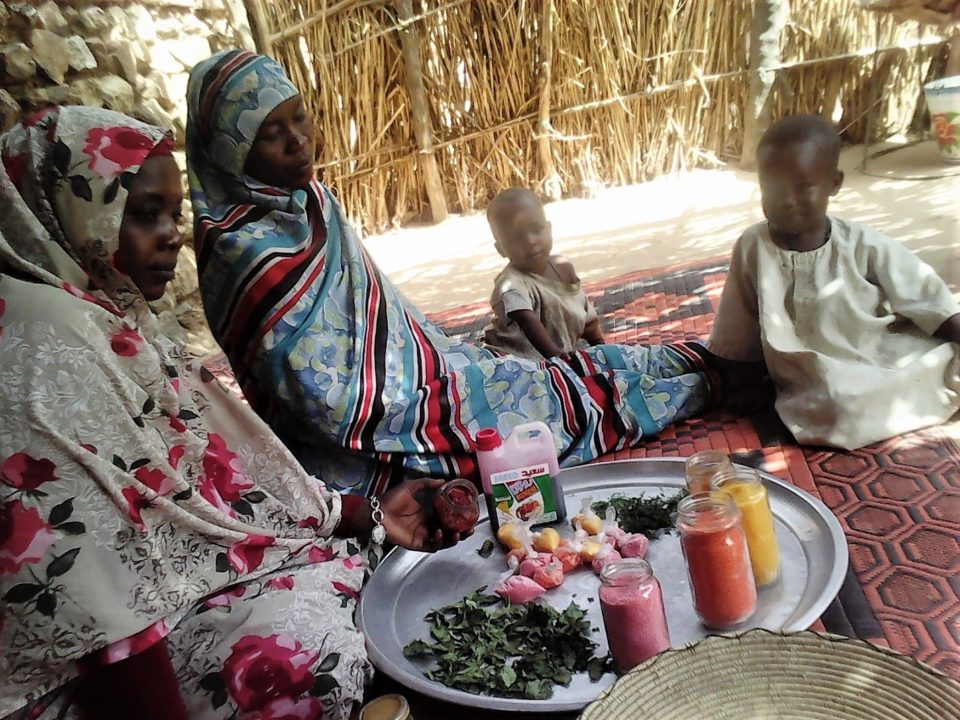 Stories
Stories
September 18, 2018 • 3 min read
“I started my food processing business with $5 as capital, and now my business has really developed, reaching $30 and it has kept growing. I am very grateful to GOAL"

Batool, is a mother of two who lives in Kutum, North Darfur. Her youngest child, Musa Adam is 24 months old and had been suffering greatly from persistent illnesses characterized by wasting, inactiveness and a massive reduction in weight. Fearing the worst after seeing her son’s condition, Batool decided to take her son to the Kutum Health Centre, where she received support from GOAL’s medical team.
On arrival to the clinic, Musa was diagnosed with severe acute malnutrition as his mid-upper arm circumference (MUAC) was less than 11.5 cm and weight-for-height z-score (WHZ) less than 3 (based on the WHO growth standard).
He was immediately enrolled in the Outpatient Therapeutic Programme (OTP) at the Centre, where he received free therapeutic feeding until his weight and MUAC increased to the recommended measurements. By the time he was discharged from the OTP after 3 months, his weight had increased from 7.5kg to 10.5kg. To avoid a relapse, Batool was enrolled into a NIPP circle in the Algharbia community where she lived.
The Nutrition Impact Positive Practice (NIPP) circles are a community-driven nutrition initiative which aim to improve the nutrition security and care in households affected by, or at risk of suffering from malnutrition. NIPP circles encourage participatory nutritional and health education alongside promoting the importance of diversifying diets in the community. Through accessing this programme, Batool gained valuable skills and knowledge to help her child, learning about positive nutritional practices, food preparation, cooking and micro gardening.
As part of what she was learning in the NIPP circle, Batool established a micro garden at her home where she has planted vegetables such as onions, okras, tomatoes, carrots and cucumbers after being provided with seed crops from GOAL.
This garden enables her to feed her family with a greater diversity of food than before. Not only this, but it has also helped her to establish an income by selling surplus food to her neighbours with Batool earning 2000 SDG ($100) from selling crops during the last harvesting season.
Upon graduating from the NIPP circle, Batool became a NIPP volunteer supporting other women in her community. In addition to micro-gardening, Batool began a business of processing food, a skill she gained from attending the NIPP circle with some of the foods she makes including fruit jams, fruit juices, biscuits and crackers.
“I started my food processing business with 108 SDG ($5) as capital, and now my business has really developed, reaching 600 SDG ($ 30) and it has kept growing. I am very grateful to GOAL for giving us skills as this not only provides me with an alternate source of income but also my children are healthy because they now consume a balanced diet at home”
With her two sources of income coming from her micro-garden & food processing, Batool has now been able to pay school fees for her first-born daughter who is attending secondary school. Alongside this, Batool has been participating in a savings fund with NIPP group members for the past two years, which has enabled her to buy items she may need at home such as a wheel barrow to help her with her garden activities.
With the support of funds from ECHO, GOAL Sudan reached a total of 1,485 beneficiaries in 2017/2018 through establishment of 99 NIPP circles. Overall NIPP achievements include an 82% cure rate in children 6-59 months and a 75% cure rate in pregnant and lactating women (PLW) admitted with MAM and discharged non-MAM after completing a 12-week cycle of NIPP. Batool in her home, with her family displaying some of the foods she has processed (Picture by Yousif Ibrahim Ismail)
